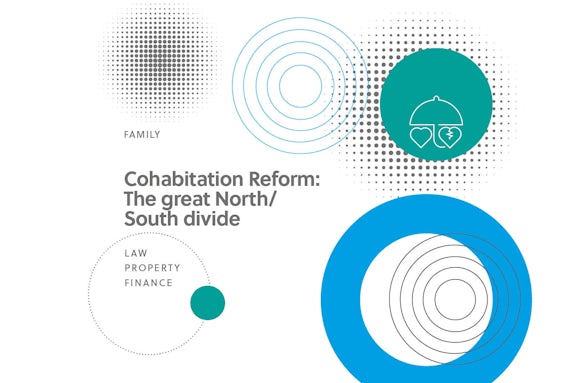The Westminster government has rejected almost all proposals for cohabitation law reform in England and Wales put forward in the Women and Equalities Committee’s report published on 1 November 2022
In England & Wales, there is no specific statutory provision for the court to make an award of a capital sum to a cohabitant following the breakdown of the relationship, except for the benefit of a child (under the Children Act 1989). Any claim by a former cohabitant is based on strict property law or the law of trusts depending on whether property is owned jointly or not
Six proposals were put forward for reform which included an opt-out cohabitation scheme, adoption of a framework concerning intestacy and family provision claims for cohabiting partners, reform to inheritance tax for cohabiting couples, and a public awareness campaign to inform people of the distinctions between getting married, being civilly partnered, and cohabiting.
The Government partially accepted two recommendations on improved support for women in religious communities where religious only (and consequently non legally binding) marriages are commonplace and improved guidance to make cohabitants more aware of their legal rights – including addressing the myth of the “common law marriage” – but deemed a full national public awareness campaign on these issues unnecessary saying that existing work on the law of marriage and divorce must conclude before it could consider changes to the law in respect of the rights of cohabitants.
Reaction to this report has been critical with family professionals group Resolution describing their position as one of “legal limbo”.
Conversely in Scotland the Report on Cohabitation together with a draft Bill implementing proposed reforms of the existing cohabitants laws was published on 2 November 2022 following a review of aspects of family law, undertaken by the Scottish Law Commission’s family law team, following the appointment of Kate Dowdalls KC as lead Commissioner in July 2018. Phase one of that project focussed on a review of the law relating to claims for financial provision on breakdown of a cohabiting relationship, otherwise than by the death of one of the cohabitants as set out in sections 25 – 28 of the Family Law (Scotland) Act 2006.
Presently in Scotland a cohabitant can apply for an award of capital sum from their ex-partner where they can prove they have suffered an “economic disadvantage”, or the other party has derived an “economic advantage”, from contributions made by them or in the interests of the other party or a child. Applications must be made within one year of the cessation of cohabitation.
Below is an overview of the reforms proposed within the Report
Identifying a “cohabitant”
The Commission’s proposals offer a new approach by removing the current comparison with married couples or civil partners when defining a cohabitant and instead basing that on the presence of an ‘enduring family relationship’. In determining whether such a relationship exists the court should consider, the duration of the relationship, the extent to which the persons live (or lived) together in the same residence, the extent to which the persons are (or were) financially interdependent and whether there is a child of whom the persons are the parents or who is (or was) accepted by the persons as a child of the family.
Financial provision
The report also provides a new clearer test for awards, justified by the application of guiding principles and taking account of the parties present and foreseeable resources with guiding principles aimed at achieving ‘fair, justified and reasonable’ outcomes for both.
Cohabitation claims are currently restricted to payments of capital but under the Commission’s proposals claims would be extended to include orders for transfer of property, payments for relief of serious financial hardship for a maximum period of 6 months, incidental orders for valuation, sale and occupancy of property, use of its contents and liability for outgoings and for the giving of security for financial provision be made available.
Time Bar
Cohabitants currently have one year from the cessation of cohabitation to seek financial provision and the Report recommends that the existing time limit be retained and in addition provision for the exercise of judicial discretion to permit late claims on special cause shown be introduced for a period of up to two years following the cessation of cohabitation. Additionally it has been recommended that cohabitants themselves can agree to extend the one year time by a period of six months, on one occasion only, to facilitate settlement.
Cohabitation Agreements
The report recommends that the court must have regard to the terms of any agreement entered into between the cohabitants whether entered into before, during or after the
end of the cohabitation and that cohabitants should be able to apply for the variation or setting aside of a cohabitation agreement on the basis the agreement was not fair and reasonable at the time it was entered into.
These proposed reforms whether implemented in whole or in part will be welcomed by the legal profession and clients alike bringing much more clarity and flexibility than has been afforded to date. Whilst the laws in England & Wales on divorce have recently been simplified by introducing a no fault divorce and, it could be argued ,are therefore more progressive than in Scotland it seems almost contradictory that the proposed reforms which would give cohabitants solidified rights have been rejected and will no doubt come as a disappointment to many.
For more information please contact Sarah Feeney, Associate email SFeeney@gilsongray.co.uk or telephone +44 (0)141 530 2034








